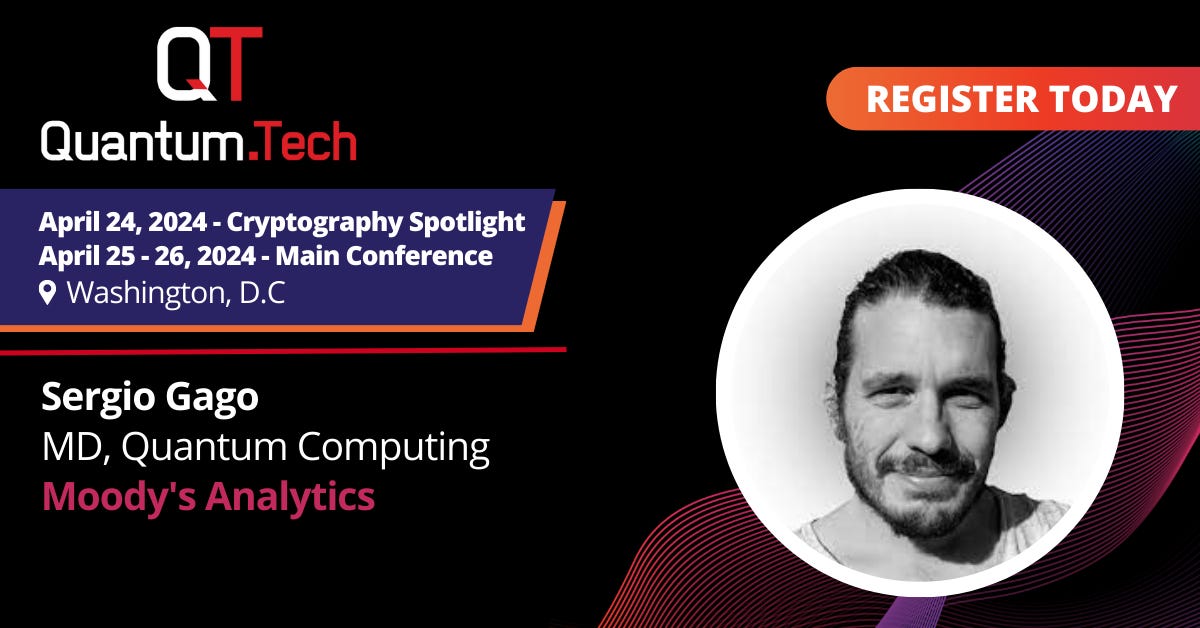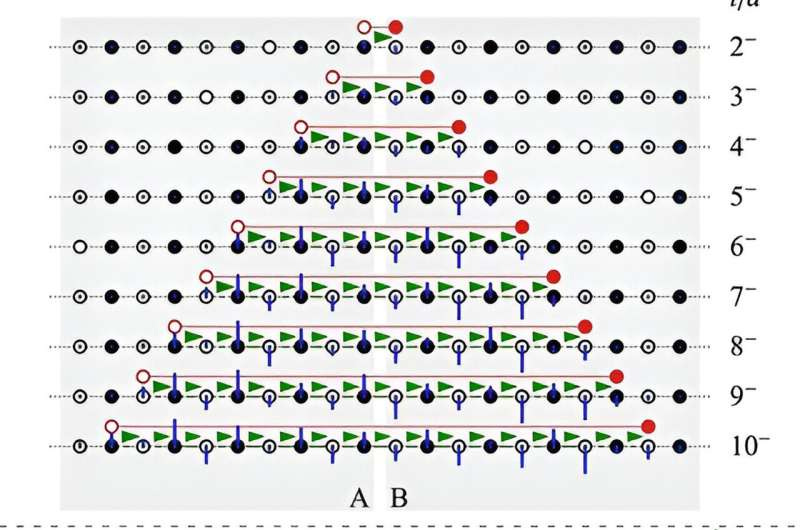The Week in Quantum Computing - March 25th 2024 - IQM cloud, D-Wave Expands Executive Team, Zapata AI Gears Up for NASDAQ, ORCA and Nvidia
Issue #178
The Week in Quantum Computing. Brought to you by Sergio Gago (@piratecto).
Quick Recap
After the Nvidia GTC event, lots happening. 6100 highly coherent qubits for example. Also IQM launches their first QC cloud. D-Wave Quantum Inc. expands their executive team to drive growth and product innovation, and industry giants like NVIDIA launching cloud services to facilitate quantum research. Meanwhile, research institutions like the University of Waterloo are receiving substantial funding for quantum projects. Innovations such as the optical tweezer array developed by Hannah J. Manetsch's team and ORCA Computing's demonstration of a hybrid quantum/classical algorithm highlight the rapid advancement of quantum technology. The upcoming listing of Zapata AI on the Nasdaq Stock Market indicates the increasing recognition of quantum computing's potential in the financial market.
Join me at this event. Quantum music gig included!
The Week in Quantum Computing
The Role of Quantum Computing in Data Science
Quantum computing is set to revolutionize data science with its unprecedented processing power, according to Dataversity. The principles of quantum mechanics allow quantum bits (qubits) to exist in multiple states, enabling quantum computers to process vast amounts of data at high speeds. This technology could transform data analysis, making real-time processing more feasible across industries such as finance and healthcare. Quantum computing also has potential to revolutionize artificial intelligence by training more complex AI models in less time than conventional computers. Furthermore, quantum-enhanced machine learning algorithms could lead to more accurate predictive models, potentially forecasting stock market trends, weather patterns, or disease outbreaks with greater precision.
https://www.einnews.com/pr_news/696746383/the-role-of-quantum-computing-in-data-science
Quantum Computing: Is the Commercial Advantage Race Paved With Gold?
IDTechEx, a market intelligence company, highlights the potential of quantum computing to revolutionize various sectors such as pharmaceuticals, finance, and materials science.
Open Hardware Solutions in Quantum Technology
The first review article on open hardware solutions in quantum technology, co-authored by researchers from various global institutions and organizations, has been published in APL Quantum. The paper outlines the current state of open hardware, listing examples of existing tools and recommendations for future development. Notable software tools for design include pyEPR, KQCircuits, and Qiskit Metal, while ARTIQ, QICK, and QubiC leverage FPGAs for control and data acquisition. The Unitary Fund has awarded grants for open hardware projects, including labscript-qc, sqooler, and OpenQuantum. The establishment of facilities like Sandia's QSCOUT and the Open Quantum Design are welcomed as they foster growth in this ecosystem.
https://unitary.fund/posts/2024_open_hardware/
Paper: Evaluation of Quantum and Hybrid Solvers for Combinatorial Optimization
In a paper by Amedeo Bertuzzi, Davide Ferrari, Antonio Manzalini, and Michele Amoretti, quantum and hybrid solvers for combinatorial optimization are evaluated, with a focus on technologies provided by D-Wave Systems. The evaluation uses a model for data center energy optimization as a benchmark. The study finds that quantum annealers have reached a scale of thousands of qubits, three orders of magnitude more than universal quantum computers. D-Wave's quantum and hybrid solvers are compared, and the hybrid solver is identified as the most suitable for the application, outperforming CPLEX, a classical solver.
https://arxiv.org/abs/2403.10455v1
D-Wave Bolsters Executive Leadership Team for Rapid Growth and Strategic Execution
D-Wave Quantum Inc., the world's first commercial supplier of quantum computers, has expanded its executive team to boost its growth strategy and product innovation. IT veteran Lorenzo Martinelli is appointed as the company's first Chief Revenue Officer, responsible for driving D-Wave's commercial expansion into key markets. Dr. Trevor Lanting is promoted to Chief Development Officer to lead the product innovation roadmap. CEO Dr. Alan Baratz believes the new appointments will be crucial in executing D-Wave's go-to-market strategy, creating new commercial opportunities, and advancing their technology innovation.
https://finance.yahoo.com/news/d-wave-bolsters-executive-leadership-110000636.html
NSERC Alliance grants 2024 recognize five quantum projects at the University of Waterloo
The Government of Canada has invested nearly $7M in five quantum projects at the University of Waterloo via the NSERC Alliance Grants. The projects are led by five faculty members from the Institute for Quantum Computing (IQC) and aim to advance quantum research in Canada. Dr. Jonathan Baugh received $1.48M for a project developing novel photonic sources for quantum remote sensing and communications. Dr. Adrian Lupascu was awarded $1.14M to develop a scalable superconducting quantum computing platform. Dr. Michael Reimer, with an investment of $2M, will develop quantum sensors using semiconductor nanowires. Dr. Jan Kycia and Dr. Lan Wei were also granted funds for respective projects.
NVIDIA Launches Cloud Quantum-Computer Simulation Microservices
NVIDIA has launched a cloud service, NVIDIA Quantum Cloud, to facilitate quantum computing research in domains like chemistry, biology, and materials science. Using NVIDIA's open-source CUDA-Q™ platform, which is deployed by 75% of companies using quantum processing units, this microservice allows users to build and test new quantum algorithms and applications. Tim Costa, NVIDIA's director of HPC and quantum computing, emphasized the transformative potential of quantum computing. The Quantum Cloud includes third-party software integrations and is being incorporated by major cloud service providers like Google Cloud, Microsoft Azure, and Oracle Cloud Infrastructure. NVIDIA's quantum computing ecosystem comprises over 160 partners.
https://nvidianews.nvidia.com/news/nvidia-launches-cloud-quantum-computer-simulation-microservices
ORCA Computing Unveils First Demonstration of a Hybrid Algorithm Utilizing the ORCA PT-1 Photonic Quantum Processor and NVIDIA CUDA Quantum
ORCA Computing has successfully demonstrated a hybrid quantum/classical algorithm using its PT Series System and NVIDIA CUDA Quantum, marking a significant advance in quantum computing applications. The algorithm has demonstrated versatility across various use cases, including generative chemistry, time series forecasting, and satellite image processing. Richard Murray, CEO of ORCA, emphasized the potential of hybrid quantum-classical computing in addressing complex challenges. The ORCA PT-1 photonic quantum processor was central to this achievement, with a focus on image generation using a hybrid generative adversarial network approach. ORCA's recent selection to develop a quantum computing testbed for the National Quantum Computing Centre (NQCC) further affirms its leading role in quantum computing development.
Zapata AI Expected to Trade on the Nasdaq Under Ticker Symbol ZPTA
Zapata AI, an industrial generative AI company, is set to list on the Nasdaq Stock Market under the ticker symbol ZPTA. This follows a business combination with Andretti Acquisition Corp., a special purpose acquisition company. Christopher Savoie, CEO of Zapata AI, emphasized that this move validates their business model and adds credibility with their customer base. Zapata AI develops generative AI applications to solve complex problems for enterprise and government customers, including BASF, BBVA, BP, DARPA, Andretti Global, and Sumitomo Mitsui Trust Bank. The firm intends to focus on innovation, customer acquisition, and growth strategy.
https://zapata.ai/news/zapata-ai-expected-to-trade-on-the-nasdaq-under-ticker-symbol-zpta/
Paper: A tweezer array with 6100 highly coherent atomic qubits
A research team led by Hannah J. Manetsch has created an optical tweezer array that traps over 6,100 atomic qubits, a significant increase from the typical tens to hundreds. The array, which simultaneously traps neutral atoms in around 12,000 sites, also boasts a record coherence time of 12.6 seconds for hyperfine qubits. The trapping lifetimes are close to 23 minutes with an imaging survival of 99.98952% and an imaging fidelity of over 99.99%. This development, supported by the Simons Foundation, signifies a major breakthrough in quantum computing, bringing the prospect of universal quantum computing with ten thousand atomic qubits closer to reality.
https://arxiv.org/abs/2403.12021v1
IQM Quantum Computers launches IQM Resonance, a cloud service to advance quantum exploration and research
IQM Quantum Computers, a global leader in quantum computers, has launched IQM Resonance, a cloud service for quantum exploration and research. The service allows developers and scientists to access IQM's advanced quantum systems to develop, test, and benchmark quantum algorithms. IQM Resonance uses a time slot subscription model and is provided by quantum computers based in IQM's data centres in Espoo, Finland, and Munich, Germany. The launch comes after IQM's recent announcement of benchmarks for its 20-qubit quantum computer. According to Hyperion Research, cloud computing is predicted to be the preferred access method for quantum computing by 2025. "We are excited about this service to guide scientists to quantum advantage", says Mikko Välimäki, Co-CEO at IQM Quantum Computers.
Cracking the quantum code: Simulations track entangled quarks
Theorists and computational scientists from the U.S. Department of Energy's Brookhaven National Laboratory and Stony Brook University have used quantum simulations to explore quantum entanglement. The team, led by Dmitri Kharzeev, developed simulations to check if entanglement persists in secondary particles from high energy particle collisions. The simulations, published in Physical Review Letters, showed strong entanglement over short distances. This research provides a basis for testing in nuclear physics experiments at the Relativistic Heavy Ion Collider, the Large Hadron Collider, and the future Electron-Ion Collider. The method used also offers insights into leveraging existing computing assets for quantum calculations. The findings underscore the importance of quantum entanglement in understanding subatomic particle behavior.
https://phys.org/news/2024-03-quantum-code-simulations-track-entangled.html
UMass Amherst Researchers Join $26 M Quantum Computing Effort to Build Internet of the Future
Researchers at the University of Massachusetts Amherst, led by Don Towsley, are designing the infrastructure for future city-scale quantum networks. This is part of a $26 million, five-year project overseen by the Center for Quantum Networks, a National Science Foundation engineering research center led by the University of Arizona. The team is working on transmitting qubits securely, a task requiring expertise in computer science and engineering. The project is part of a larger initiative at UMass, supported by a $5 million gift from anonymous donors, to develop a quantum internet and provide network security for quantum computers.
https://www.azoquantum.com/News.aspx?newsID=10171
Verifying the Work of Quantum Computers
Caltech researchers have developed a method to measure the error rates of quantum computers without having to fully simulate them, as detailed in a paper published in Nature. The team, led by graduate student Adam Shaw, used a quantum simulator made up of individually controlled Rydberg atoms manipulated by lasers. The simulator, which has 60 qubits, is in a regime that is impossible to simulate exactly. The researchers ran classical computer simulations that allowed for varying degrees of entanglement. By comparing these simulations to the quantum computer's results, they could estimate the quantum system's errors.
https://www.caltech.edu/about/news/verifying-the-work-of-quantum-computers
Here Are 6 Actual Uses for Near-Term Quantum Computers
Google and XPrize have announced a $5 million prize for anyone who can find practical applications for quantum computers. Despite recent skepticism, quantum computing has potential for significant impact in specialized fields, according to Ryan Babbush, head of quantum algorithms at Google, and Matthias Troyer, corporate vice president of Microsoft Quantum. Troyer highlights the commercial impact of quantum systems in chemistry, material science, and pharma. Quantum computers could simulate quantum phenomena relevant to these industries, potentially leading to a new Quantum Age.
https://spectrum.ieee.org/what-are-quantum-computers-used-for
Noise Fuels Quantum Leap, Boosting Qubit Performance by 700%
Researchers from the Niels Bohr Institute (NBI) have developed a method to use noise to process quantum information, enhancing the performance of the quantum computing unit, the qubit, by 700%. The team, led by Ph.D. researcher Fabrizio Berritta, employed continuous real-time noise surveillance and adaptation, using FPGA technology and machine learning for real-time measurements and analysis. This international collaboration involved groups at Purdue University, Norwegian University of Science and Technology, and companies QDevil and Quantum Machines. The findings, published in Nature Communications, mark a significant step towards the development of quantum computers. Berritta suggests this approach could be relevant for other types of qubits.
https://scitechdaily.com/noise-fuels-quantum-leap-boosting-qubit-performance-by-700/
EU leaders showcase quantum technology ambitions after signing landmark pact
EU leaders have signed the Quantum Pact, affirming the strategic importance of quantum technologies for the EU's scientific and industrial competitiveness. The pact aims to make Europe the global center for quantum technologies. The European Declaration on Quantum Technologies, celebrated at the 'Shaping Europe's Quantum Future' conference, sets the stage for collaboration, investment, and innovation. EU Commissioner for Internal Market, Thierry Breton, called the signing a historic step. The pact has been signed by representatives from 20 European countries. The conference also unveiled the Belgium Quantum Circle, an initiative promoting collaboration and innovation in quantum technologies across Europe. The event included keynotes, panel discussions, and workshops highlighting the EU's strategy for the 'Quantum Decade'.
Commission presents five pillars for quantum development
The European Commission has outlined five pillars to boost Europe's competitiveness in quantum computing, a technology that outperforms supercomputers in solving complex problems. The pillars will form the basis of an action plan detailed in the EU Quantum Declaration. However, the Commission has not disclosed the budget or timeline for the plan. The quantum pact aims not only to maintain Europe's competitiveness in quantum computing but also to transform it into a powerhouse in the field. Deputy Director-General of DG CONNECT, Thomas Skordas, announced the plan at the Quantum Flagship event in Brussels. The race to develop quantum computers is intensifying globally.
Quantum Computing Revolution Imminent: Deloitte's Report Predicts $50 Billion Investment Surge in Next Five Years
Deloitte Australia's new report, "The Quantum Countdown: Preparing for a new tech revolution", highlights the upcoming significance of quantum computing in the tech industry. The potential applications of quantum technology, from advancing medical research to combating climate change, are vast and impressive. The report reveals that global investment in this technology is expected to surge to US $50 billion within the next five years, underscoring the urgency for organisations to understand and adapt to this transformative technology. The report also explores the real-world applications of quantum computing and offers insights on how organisations can harness its power while safeguarding against emerging threats in cyber and data security.
https://www.deloitte.com/au/en/issues/trust/quantum-computing-revolution.html
The Great Covergence: The Future of Quantum and AI
Arthur Herman, Senior Fellow at the Hudson Institute and director of its Quantum Alliance Initiative, asserts that the future of artificial intelligence (AI) and machine learning (ML) will be significantly influenced by their integration with quantum technology. He believes this combination will drive productive economic growth and a manufacturing and industrial renaissance for America. Quantum computing's capabilities in combinatorial optimizing and complex system modeling will enhance AI/ML tasks. The convergence of AI and quantum will have limitless applications in areas such as robotics, supply chain management, biotech research, military technology, space exploration, and power grid management. Herman emphasizes the necessity to explore the potential of this Quantum/AI revolution now.
https://thequantuminsider.com/2024/03/22/the-great-covergence-the-future-of-quantum-and-ai/






